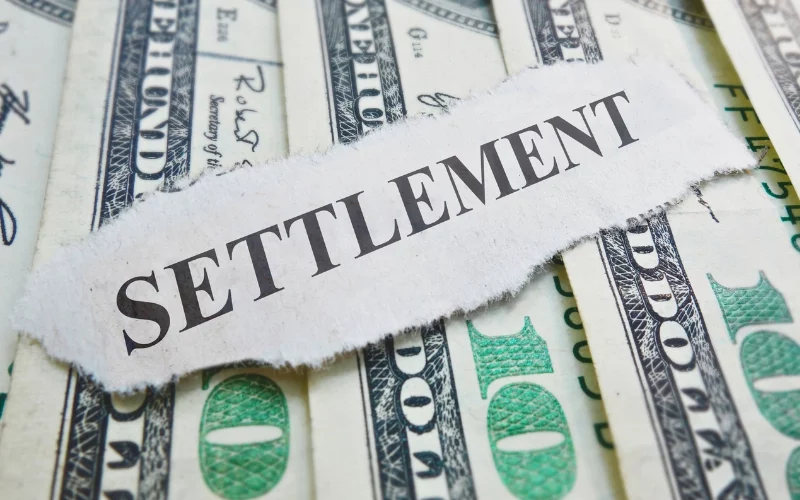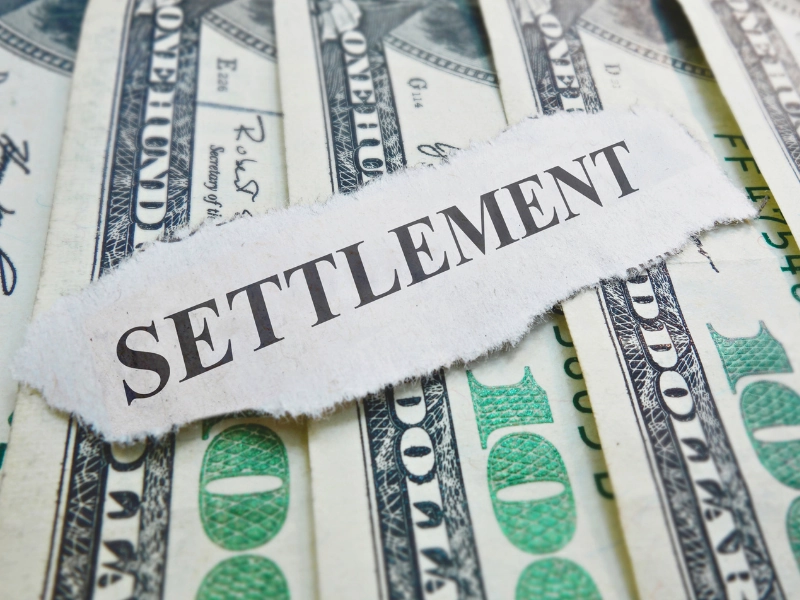Can Personal Injury Settlements Be Garnished?
30Apr
Can personal injury settlements be garnished? If you are filing an insurance claim or lawsuit and owe money, you might be concerned about whether settlement money can be garnished. In Florida, personal injury settlement proceeds are generally protected from creditor garnishment. However, the government may garnish part of your settlement for back taxes, unpaid child support, or other outstanding debts.

To protect your payout from garnishment, reach out to Light & Wyatt Law Group at (727) 499-9900 for assistance in safeguarding your personal injury settlement.
Table of Contents
Are Personal Injury Settlements Protected from Garnishment?
In Florida, personal injury settlements are typically shielded from garnishment, which means that creditors generally cannot claim these funds to pay off debts. Creditors and injury settlements share a complicated relationship, as there are exceptions to this rule. Specifically, settlements may be subject to garnishment for overdue child support or alimony, medical liens associated with the injury, and possibly by government agencies for tax obligations or other debts.
What Is Garnishment?
Garnishment is a court order that allows a third party to seize a debtor’s assets. Wage garnishment, requiring a court order, enables creditors to deduct a portion of an employee’s wages to settle unpaid debts, with limits on the amount that can be taken.
This process can also apply to alimony or child support, pending a court order. In the U.S., garnishment cannot exceed 25% of the debtor’s disposable income, which is the money remaining after essential expenses. The court determines the withholding amount during the garnishment hearing.
Personal Injury Settlements Are Typically Exempt From Garnishment
In Florida, there are conditions under which a personal injury settlement cannot be garnished. Florida law states that a personal injury settlement is exempt from garnishment unless a creditor can demonstrate that they were defrauded or that the debtor attempted to evade repayment. Additionally, exemptions for head-of-household status also protect personal injury settlements from garnishment.
Head-of-Household Exemptions
Under Florida law, head-of-household exemptions safeguard personal injury settlements from getting garnished. This protection applies to individuals recognized as the primary provider for more than half of a minor child’s or dependent’s financial support, or if their weekly income is $750 or lower. If their earnings are higher than that, any garnishment of their settlement requires written consent.
A Government Agency Could Garnish Your Settlement for Child Support
Typically, private companies are not allowed to garnish your personal injury compensation, but government agencies can. They have the authority to withhold funds from your settlement for reasons such as child support obligations or federal and Florida state taxes. However, they must obtain a court order to access your payment account.
As stated by the Florida Department of Revenue, if you owe past-due child support, the state’s Child Support Program may collect a portion of your settlement. There is a cap on how much they can take, and they will take into account the costs associated with your injury-related damages.
What Factors Can Lead to Garnishment of Personal Injury Settlements?
Several elements influence the garnishment of personal injury settlements in Florida. These include relevant state laws, the type of creditor, whether bankruptcy has been filed, the structure of the settlement (whether it’s a lump sum or structured as an annuity), details of the award, and the involvement of legal representation.
Florida Laws
In Florida, laws generally safeguard personal injury settlements from garnishment, although there are a few exceptions. Typically, creditors cannot seize your settlement to repay debts. While personal injury settlements are usually protected, if the settlement consists of amounts beyond compensation for physical injuries, such as punitive damages, those non-compensatory parts may be eligible for garnishment.
Overdue Child Support
Personal injury settlements can be subject to garnishment for overdue child support or alimony payments in Florida. In the United States, approximately 30% of parents entitled to child support payments receive nothing. Fulfilling child support obligations is mandatory, and these payments can be deducted directly from your settlement funds. If you receive a monetary award from a personal injury case, those funds could be garnished if you have outstanding child support.
Additionally, courts often consider the intended use of the settlement money. If the funds are designated for specific purposes like medical expenses or rehabilitation, they may be treated differently. This situation requires careful consideration; balancing parental responsibilities with the need for compensation for your injuries is crucial. Staying informed and having proper representation can safeguard your rights while ensuring you meet your obligations.
The Type of Creditor
Standard creditors are unable to garnish your personal injury settlement unless the money is obtained through fraudulent activities. However, there may be tax implications for personal injury settlements. Debts such as federal and state taxes, as well as court-mandated payments like alimony and child support, may be subject to garnishment.
Filing for Bankruptcy
Filing for bankruptcy provides protection from creditors attempting to collect on debts. Under Florida law, certain debts can be eliminated after filing, and creditors are barred from collecting on personal injury settlements.
Your Settlement Structure
Personal injury settlements can be received as a single payment or as structured annuity payments. A lump sum gives you all the funds at once, whereas structured settlements deliver payments monthly or annually.
While a lump sum is favored by many, it can lead to the risk of overspending. On the other hand, structured or annuity payments can help mitigate that risk, but they might complicate repayment of certain debts. A lump sum offers greater flexibility, while structured payments encourage a more disciplined approach to finances.
Specifications of Your Settlement
The details of your personal injury settlement can play a role in whether it is subject to garnishment. This award is intended to cover things like medical bills, lost income, decreased earning potential, property damage, and both physical and emotional distress, among other losses.
Legal Representation
Legal representation can be beneficial if you’re concerned about possible garnishment from your settlement. After advising you on when you should sue for personal injury, an attorney can evaluate your circumstances to see if garnishment is a risk. Understanding the intricacies of personal injury settlements and garnishments is best done with legal guidance. Speaking with a personal injury lawyer can help you clarify the protections available to you and how to arrange settlements to reduce the risk of garnishment. You may ask how much personal injury lawyers charge to ensure your expenses are planned for.
How to Protect Personal Injury Settlements from Garnishment
There are specific tactics that can be implemented to safeguard personal injury settlements from getting garnished. These involve arranging settlements in a particular way, establishing trusts or annuities, and ensuring the correct terms of the settlement.
Structuring Settlements
Opting for structured settlements for personal injury compensation can help safeguard those funds from creditors. By selecting an annuity payment plan rather than a lump sum, you may reduce the chances of creditors accessing your money.
Creating Trusts or Annuities
Keeping settlement funds in trusts or annuities can shield them from garnishment. Either choice guarantees a steady income stream and offers reassurance.
Negotiating Settlement Terms
An attorney can engage in discussions with creditors to find a resolution regarding the handling of your settlement. If you have debts that could lead to your personal injury settlement getting garnished, negotiating with creditors may be beneficial. Many creditors are open to reducing interest rates and accepting smaller payments in order to ensure they receive some payment.
When Should You Call Your Lawyer?
If you find yourself with creditors seeking payment or have overdue support or tax obligations, it’s essential to talk about your situation with your attorney. They can evaluate your circumstances and help safeguard your rights.
If you’ve been injured and faced expenses, you should receive fair compensation for your losses. This compensation may come from an insurance settlement or a civil lawsuit, and the amount you can receive will depend on several factors, including whether a government entity might claim a portion of your settlement.
A garnishment might be applicable to a lump-sum settlement or an annuity, depending on the relevant laws. But, is it worth hiring a personal injury attorney? A personal injury attorney can help safeguard your settlement. After reviewing your situation, they will first check if you have any outstanding debts, and then will:
- Build a strong case against the party at fault
- Evaluate your losses related to the injury
- Analyze the impact of garnishment on your recovery
- Ensure that other parties do not take away what you are entitled to
In the financial aftermath of an injury, grasping the protections available for settlements is crucial. While Florida generally safeguards personal injury settlements from garnishment, there are exceptions, which makes it vital to make informed choices and seek legal advice. Contact us at Light & Wyatt to safeguard your personal injury settlement. Our personal injury attorney can help you secure and retain maximum compensation.
